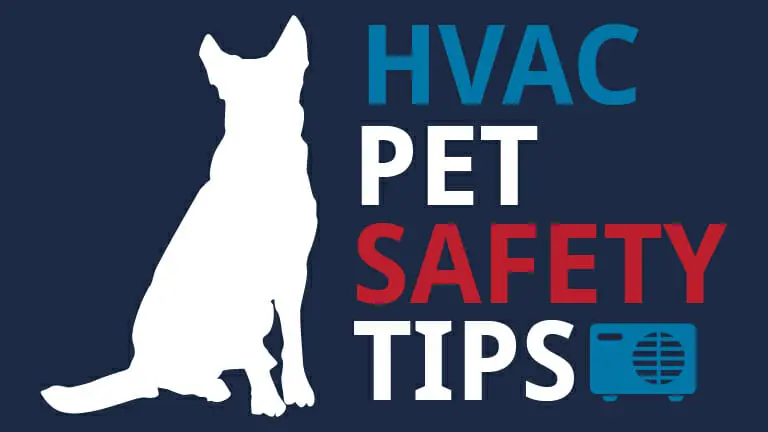
HVAC Pet Safety Tips
Every pet owner that loves their dog, cat or other animal wants them to be safe in their home. If you’re a pet owner, you’ll want to know what to look out for to make sure your heating, ventilation and air conditioning equipment and habits are not hazardous to your pets. Follow these HVAC pet safety tips to ensure your pets remain safe and comfortable.
With some preparation and knowledge of seasonal dos and don’ts, you can be sure that your pet will be safe, both while you’re home and while you are away. Below are some tips for keeping your pets comfortable, safe and happy in your home.
Be Mindful of Extreme Heat or Cold
Just like humans, pets can be affected by extreme hot or cold temperatures, and as we can, animals also can suffer from heat exhaustion or sickness.
We know that animals have ways of dealing with heat or cold better than humans. While, for the most part, animals are born survivors, it’s important to remember that they have no way of communicating when the weather becomes too much for them to bear.
Your heating and cooling can be expensive if left on when away from home. So… where should you plan to keep your house’s temperature?
Summer: In the summer, most dogs and cats will shed, reduce movement and pant more to endure higher temperatures. If your home is equipped with a thermostat, you can set your HVAC systems to higher, more, energy-efficient levels while you’re out of the house. For example, most dogs and cats will be perfectly fine at temperatures between 78-80 degrees in the summer.
Winter: In the winter, most pets’ coats will grow out to protect them from the cold, though some short hair breeds may be more susceptible to extreme temperatures. Be cautious of drastically reducing your heat when you leave your home. Dogs and cats will adjust to most temperatures but sudden drops in temperature can affect your pet’s health. We wouldn’t set the thermostat too much lower than 66-68 degrees in the winter.
For snakes, reptiles, or other non-conventional pets, you’ll want to refer to a veterinarian for the best home comfort levels.
Always Use Vent Covers
Animals will get into the smallest places. They can be curious when they are unaware of the dangers that exist within your home’s heating and cooling systems. Depending upon the size of the vents in your home, your pets can potentially enter them and become stuck. Be sure to place vent covers throughout all the entry and exit points that exist within your home.
Deny access to any areas that can become a safety hazard for your animal. If you do not currently have covers for your equipment, contact an HVAC provider to have them installed in your home. This will help to prevent accidents from occurring in your ventilation system and will keep your pets out of danger.
Keep Your Pets Away from Heating and Cooling Equipment
Generally, your home comfort equipment, including equipment outside, in your basement or otherwise, should be safe to navigate around. However, if you have children or small pets in your home, it’s important to take some safety measures to ensure that they cannot access and tamper with the equipment. A pets interaction with your HVAC equipment can cause them to become injured, and it may also damage your equipment and household.
Here are a few ways to safeguard your HVAC equipment:
- Do not allow pets around equipment unattended
- Block or fence off areas where dogs and cats can enter and become stuck
- Teach animals to keep away from certain areas in your home
- Lock basement doors and rooms with heating and cooling equipment
If you want to keep your pet safe, follow the tips provided above and refer to specific instructions from your veterinarian to ensure your home is pet-friendly. Always be sure to inspect areas of your home for potential threats, as no two homes are the same and will require different levels of upkeep to ensure that your pet is safe from harm.
If you believe that you could do a better job protecting your pets (and your HVAC equipment), and want expert advice, contact us today and we can perform a home safety inspection.
